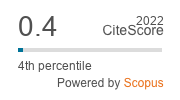Entomological investigations on sporadic Japanese encephalitis sero-positivity in Tamil Nadu, India
DOI:
https://doi.org/10.33307/entomon.v45i2.517Abstract
In India, Japanese Encephalitis (JE) continues to be a public health issue in some parts of our country. JE surveillance includes early reporting of clinical cases, sentinel sero-surveys and vector surveillance in the endemic areas. In the present study, JE longitudinal vector surveillance and epidemiological investigations were carried out for the first time during two consecutive years in the endemic district of Tamil Nadu. 22,538 mosquitoes were collected, species identified and screened for JE virus by RT-PCR. Predominant was Culex tritaeniorhynchus (60%) and followed by it Anopheles subpictus (23%), Culex quinquefasciatus (8%) and Culex gelidus (3%). It suggests that Culex tritaeniorhynchus may act as major vector and An. subpictus may act as secondary vector. Monsoon and post-monsoon seasons favour breeding of Cx. tritaeniorhynchus leading to vector abundance. Preferential resting sites for Cx. tritaeniorhynchus were pig and cattle shed. Although clinical cases have been reported seasonally in the three blocks, the presence of virus among field caught mosquitoes could not be established by RT-PCR. It may be due to the low titre value of JE virus in mosquitoes. This is the first report of JE investigations in the endemic district of Tamil Nadu and it helps to formulate the effective control strategies for JE virus transmission.


